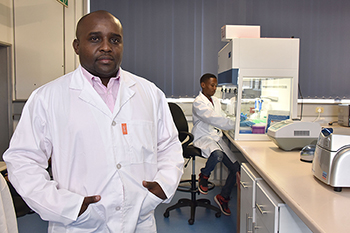
Dr Martin Nyaga and his research assistant,
Tshidiso Mogotsi in the Next Generation
Sequencing Laboratory.
Photo: Charl Devenish
The Next Generation Sequencing (NGS) unit at the UFS was established as an interdisciplinary facility under the Directorate for Research Development, Faculty of Health Sciences and Faculty of Natural and Agricultural Sciences.
The aim of the NGS facility is to aid internal and external investigators undertaking studies on Deoxyribonucleic acid (DNA) sequencing, assembly and bioinformatics approaches using the more advanced Illumina MiSeq NGS platform.
The NGS unit became operational in 2016 and is managed by Dr Martin Nyaga and administered through the office of the Dean, Faculty of Health Sciences, under the leadership of Prof Gert Van Zyl. Dr Nyaga has vast experience in microbial genomics, having done his PhD in Molecular Virology.
He has worked and collaborated with globally recognised centres of excellence in Prokaryotic and Eukaryotic genomics, namely the J. Craig Venter Institute and the Laboratory of Viral Metagenomics, Rega Institute, among others.
The unit has undertaken several projects and successfully generated data on bacterial, viral and human genomes. Currently, work is ongoing on bacterial and fungal metagenomics studies through 16S rRNA sequencing.
In addition, the unit is also working on plasmid/insert sequencing and whole genome sequencing of animal and human rotaviruses. The unit has capacity to undertake other kinds of panels like the HLA, Pan-cancer and Tumor 15 sequencing, among others.
Several investigators from the UFS including but not limited to Prof Felicity Burt, Prof Wijnand Swart, Dr Frans O’Neil, Dr Trudi O'Neill, Dr Charlotte Boucher, Dr Marieka Gryzenhout and Dr Kamaldeen Baba are actively in collaboration with the NGS unit.
The unit has also invested in other specialised equipment such as the M220 Focused-ultrasonicator (Covaris), 2100 Bioanalyzer system (Agilent) and the real-time PCR cycler, the Rotor-Gene Q (Qiagen), which both the UFS and external investigators can use for their research.
Investigators working on molecular and related studies are encouraged to engage with Dr Nyaga on how they would like to approach their genomics projects at the UFS NGS unit.